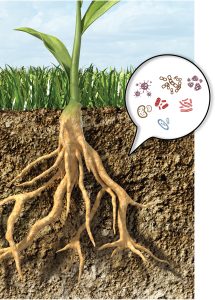The Power of Microbebio Microbes in Soil Remediation
 In the ongoing battle to restore and preserve our environment, innovative solutions are critical. Microbebio is at the forefront of this movement, offering a revolutionary approach to bioremediation that utilizes the power of microbes, mycorrhizal fungi, and 100% organic nutrients. This approach not only enhances crop yield and quality but also plays a pivotal role in remediating contaminated soils, such as those affected by Agent Orange, and improving water quality. By protecting the environment and reducing CO2 emissions, Microbebio is paving the way for a healthier planet and sustainable food production for future generations.
In the ongoing battle to restore and preserve our environment, innovative solutions are critical. Microbebio is at the forefront of this movement, offering a revolutionary approach to bioremediation that utilizes the power of microbes, mycorrhizal fungi, and 100% organic nutrients. This approach not only enhances crop yield and quality but also plays a pivotal role in remediating contaminated soils, such as those affected by Agent Orange, and improving water quality. By protecting the environment and reducing CO2 emissions, Microbebio is paving the way for a healthier planet and sustainable food production for future generations.
The Power of Microbes in Soil Remediation
Microbes are nature’s original recyclers, playing a crucial role in breaking down organic matter and pollutants in the soil. Microbebio harnesses these natural allies to restore soil health and productivity.
Effective Bioremediation Techniques for Agent Orange
Agent Orange, a herbicide used during the Vietnam War, has left a legacy of dioxin contamination in soils. Bioremediation offers a promising solution to this problem. Microbebio employs specific microbial strains capable of degrading dioxins, breaking them down into less harmful substances through metabolic processes. These microbes utilize enzymes to catalyze the breakdown of complex dioxin molecules, ultimately converting them into benign compounds that can be safely integrated into the environment.
Enhancing Soil Health and Fertility
Microbes in Microbebio’s formulations work tirelessly to improve soil structure and fertility. By decomposing organic matter, they release essential nutrients back into the soil, enhancing nutrient cycling and availability. This process supports robust plant growth and increases crop yields, even in soils previously considered barren or contaminated.
The Role of Mycorrhizal Fungi
Mycorrhizal fungi form symbiotic relationships with plant roots, significantly enhancing nutrient uptake and plant growth. These fungi extend the root system, allowing plants to access water and nutrients more efficiently.
Boosting Crop Yield and Quality
Microbebio leverages mycorrhizal fungi to boost crop yields and improve quality. By facilitating nutrient exchange between plants and soil, these fungi enhance plant growth and resilience. The result is healthier, more productive crops with improved aroma and taste, benefiting both farmers and consumers.
Protecting Against Pests and Diseases
Mycorrhizal associations also help protect plants from pests and diseases. By strengthening natural defense mechanisms and promoting beneficial soil organisms, Microbebio reduces the need for chemical pesticides. This leads to healthier crops and a reduced environmental impact, aligning with sustainable agriculture practices.
Long-Term Environmental Benefits
The long-term benefits of using microbes for soil remediation are significant:
Carbon Sequestration
By enhancing soil health and promoting sustainable farming practices, Microbebio helps sequester carbon in the soil. This reduces atmospheric CO2 levels and mitigates climate change, making agriculture a part of the solution to global warming.
Reducing Chemical Inputs
Healthy plants are more resistant to pests and diseases, reducing the need for chemical interventions. Microbebio supports plant health by promoting beneficial soil microbes that protect crops from harmful pathogens. This leads to healthier crops and reduced environmental impact from pesticide use.
 Comparing Bioremediation to Traditional Chemical Methods
Comparing Bioremediation to Traditional Chemical Methods
Bioremediation offers several advantages over traditional chemical remediation methods:
Cost and Efficiency
Bioremediation is generally more cost-effective than physical or chemical remediation methods. Traditional methods, such as excavation or chemical treatment, can be costly and energy-intensive, often requiring significant labor and equipment. In contrast, bioremediation utilizes natural processes, which are less disruptive and more sustainable over the long term.
Environmental Impact
Chemical remediation methods can sometimes cause additional environmental harm, such as soil degradation or water contamination. Bioremediation, on the other hand, uses natural organisms to detoxify pollutants, resulting in a more environmentally friendly approach that enhances soil health and biodiversity.
The Role of Mycorrhizal Fungi in Bioremediation
Mycorrhizal fungi are integral to the bioremediation process, offering several benefits:
- Enhanced Nutrient Uptake: These fungi form networks that extend the reach of plant roots, improving access to nutrients and water. This enhances plant growth and resilience, making them more capable of withstanding environmental stresses.
- Soil Structure Improvement: Mycorrhizal fungi contribute to soil aggregation, improving soil structure and stability. This enhances water retention and reduces erosion, further supporting sustainable agricultural practices.
As the world faces increasing challenges in food production and environmental sustainability, innovative solutions like Microbebio are essential. By harnessing the power of microbes, mycorrhizal fungi, and organic nutrients, Microbebio offers a sustainable and effective way to enhance crop yield, improve food quality, and protect the environment. With trending hashtags like #SustainableAgriculture, #Microbebio, and #OrganicFarming, spreading awareness and encouraging the adoption of these practices can help shape a better future for agriculture and the planet.
